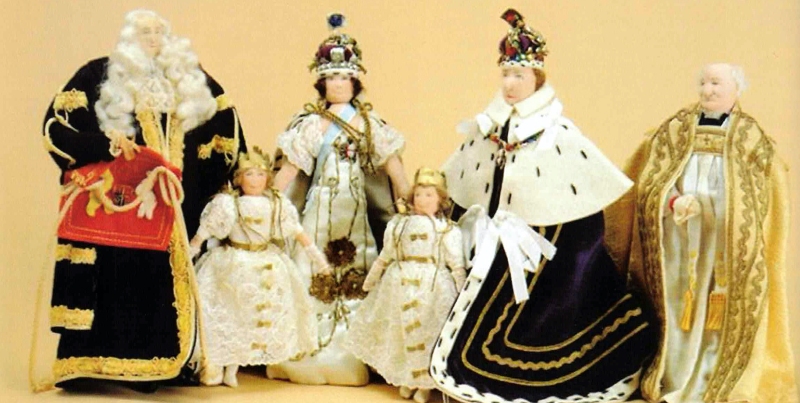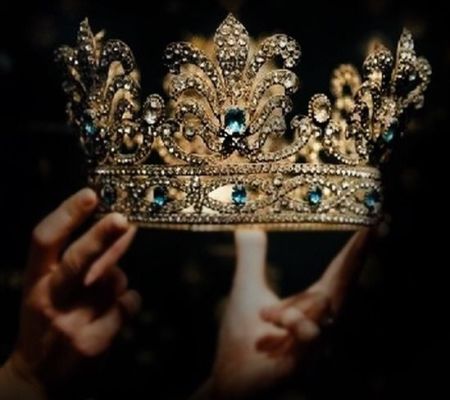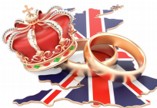
Think about the following questions.
1. Does your country have a royal family? If not, when did it last have one?
2. What do you think is the purpose of a royal family?
3. What do you know about the British royal family?
VOCABULARY PREVIEW
Match each New Academic Word List(NAWL) word with the correct definition.
- protocol _____
- indifference _____
- ultimate _____
- prejudiced _____
- paradox _____
- irrelevant _____
- a. a situation or statement that seems impossible or difficult to understand because it contains two opposite ideas
- b. not related to the current situation and therefore not important
- c. final or most important
- d. having or showing an unfair feeling of dislike for a person or group because of race, sex, religion, etc.
- e. a lack of interest in someone or something
- f. the system of rules and behavior used on official occasions
ATTITUDES TO MONARCHY

The United Kingdom is a constitutional1 monarchy. In short, this means it has a monarch-a king or queen-but the elected government has ultimate power. However, the British royal family is undoubtedly influential: they lead organizations, regularly talk to politicians, and own large amounts of land. They also remain broadly popular with the public.
A YouGov poll in 2021 found that sixty-three percent of British people believed the monarchy should continue to exist. However, if we examine the numbers more closely, they are complicated. Of those over the age of sixty-five, the number in support of monarchy was seventy-seven percent. However, among those aged eighteen to twenty-four, support was just thirty percent. This suggests that many young people believe that monarchy is now irrelevant. Significantly too, among the remaining seventy percent of young people, twenty-one percent said they did not know whether the UK should continue to have a monarchy. This indifference is probably the result of events that have left many unsure about what the monarchy's role actually is.
One major shift in the public understanding of the monarchy came with the death of Princess Diana. The daughter of a wealthy aristocrat2, she married the Queen's eldest son, Prince Charles, in 1981. From the beginning, the media portrayed Diana positively, not only as a princess but also as a glamorous3 celebrity, a charity campaigner4, and a devoted mother. So when Charles and Diana divorced in 1996, much media support and public sympathy lay with her rather than Charles.
One year later, Diana was killed in a car crash in Paris as her driver attempted to escape a group of pursuing5 press photographers. Her new boyfriend, Dodi Fayed-the son of an Egyptian billionaire—was killed alongside6 her. Because Diana was no longer an official member of the royal family, the Queen and her advisers7 were unsure of protocol and initially made no statement. Prime Minister Tony Blair, however, made an emotional speech calling Diana "the people's princess." The UK media accused the royal family of not caring, and the Queen was forced to make a statement.
An estimated one million bunches of flowers—and numerous8 soft toys—were placed at the gates of Diana's home. People who had never met Diana grieved9 as though she had been a family member. The events surrounding Diana's death showed that many wanted royals to be modern celebrities rather than distant, official figures.
A more recent controversy that revealed people's feelings about the monarchy surrounded Diana's son Prince Harry and his wife Meghan Markle, an American actress. When the couple married in 2018, some tabloids in the UK did not respond positively to the match, emphasizing that Markle was older than Harry, was previously married, and was not British. Some tabloids were also accused of racism. Markle's mother is African American, and her father, white.
The couple found life in the royal family harder than they had imagined and moved to the US, also announcing their withdrawal from official royal duties. In a high-profile interview with Oprah Winfrey, they revealed that a member of the royal family (whom they did not identify) had asked "how dark their baby's skin would be." Harry also claimed that his father, Charles, and brother, William, were "trapped in the system" of the royal family.
The situation divided opinion, with some feeling that it showed the royal family was old- fashioned and prejudiced, while others felt Harry and Meghan had walked away from their responsibilities. Again, this revealed a social divide in the UK. Among people over sixty-five, fifty-six percent said that they were on the side of the royal family; among those aged eighteen to twenty-four, that number was just fifteen percent.
The majority of British people remain in favor of the monarchy but often want it to exist on their own terms. A clear example came in 2021 with the death of the Queen's husband, the Duke of Edinburgh. On the news of his death, the tax-funded British Broadcasting Corporation (BBC) immediately turned all of its television and radio channels over to continuous coverage10 of the event. They received 110,000 complaints before shutting down the online complaints form. It is likely that some complained because they were anti-monarchy, but many just missed their favorite shows.
The UK's relationship with royalty is complex and contains many paradoxes. It seems people still like the idea that royals are "special," but they want them to be ordinary too; they like the idea of monarchy's history and tradition, but also want it to be modern and relevant.
New Academic Word List
- constitutional 1 : adj. relating to a constitution, a set of rules about how a country is run
- aristocrat 2 : n. a person of high social rank, just below the monarchy
- glamorous 3 : adj. attractive in an exciting and special way
- campaigner4 : n. a person who takes part in activities that are intended to change society
- pursue 5 : v. to follow and try to catch or capture (someone or something), usually for a long distance or time
- alongside 6 : adv. next to, or together with
- adviser 7 : n. someone whose job it is to give advice about a subject
- numerous 8 : adj. many
- grieve 9 : v. to feel or express great sadness, especially when someone dies
- coverage10 : n. the reporting of a particular important event or subject
READING COMPREHENSION
A ‣ Mark each statement as true (T) or false (F) according to the reading.
- In the UK, politicians have more power than royalty.
- True
- False
- The popularity of the British monarchy is fairly consistent, regardless of age.
- True
- False
- Television and newspapers took Diana's side in her divorce.
- True
- False
- The reaction to Diana's death showed that people want royals to stick to official duties.
- True
- False
- When the Queen's husband died, TV and radio stations changed their schedules.
- True
- False
B ‣ Choose the best answer according to the reading.
- What is the main purpose of the reading?
- a. To show that monarchy means more to British people than to other nationalities
- b. To explain why monarchy is seen as an outdated institution in most countries
- c. To describe differing attitudes in the UK toward the role of monarchy in society
- d. To argue that the British media and public should be more supportive of royalty
- In paragraph 5, the word distant is closest in meaning to _____.
- a. global
- b. detached
- c. intellectual
- d. brutal
- Why did some tabloid newspapers not approve of Meghan Markle?
- a. Because of her job, her parents, and her clothing
- b. Because of her age, her nationality, and her history
- c. Because of her nationality, her wealth, and her style
- d. Because of her race, her attitude, and her job
- What can be inferred from paragraph 7?
- a. Harry felt his family were victims of their situation.
- b. William felt Harry had let the family down by leaving.
- c. Charles asked Harry and Meghan to stay in the country.
- d. The Queen told Oprah Winfrey not to show the interview.
C ‣ Find the correct numbers in the reading and write them on the lines.
- _____: The percentage of people aged eighteen to twenty-four who were not sure if the UK should keep its monarchy.
- _____: The percentage of people over sixty-five who supported the Queen and her family when her grandson left the country.
- _____: The number of people who contacted a national broadcaster when it changed its regular schedule to cover the death of a royal.
SUMMARY
Fill in the blanks with the phrases in the box.
- criticizes the Queen
- her boyfriend
- sympathizes with
- his American wife
- are saddened by
- numerous complaints
|
1981-1996
|
|
1997
|
|
2018-2021
|
VOCABULARY PRACTICE
Fill in the blanks with the words in the box. Change the form if necessary.
- ultimate
- prejudiced
- paradox
- irrelevant
- protocol
- indifference
- Public _____ to the problem of litter has left the city's park in a total mess.
- It's a(n) _____ when Shakespeare's character Hamlet says, "I must be cruel, only to be kind."
- Whether or not a patient is a good person is _____ ; doctors must treat everyone equally well.
- When foreign leaders visit the Queen at Buckingham Palace, they are usually very careful to follow _____ .
- Social-media companies are trying to find ways to stop people from making _____ statements on their platforms.
- You need to ask Sarah. She has the _____ power to decide company policy.
SUPPLEMENTAL READING
Royal Weddings in Numbers

World War II had only been over for two years when Princess Elizabeth—later Queen Elizabeth Il-married Philip Mountbatten, the Duke of Edinburgh, in 1947. Therefore, the royal family decided not to have too large a wedding. Even so, the event at Westminster Abbey cost $10,000-around $325,000 in today's money—and 2,000 guests attended. The wedding was broadcast live on BBC radio, and as Britain had an empire, an estimated 200 million listeners around the world tuned in.
The wedding of the Queen's only sister, Margaret, in 1960, was the first to be broadcast live on television and as many as twenty million in the UK watched. It was a more expensive affair, with almost $1 million in today's money being spent on decorations alone.
By the time the Queen's son, Prince Charles, married Lady Diana Spencer in 1981, more than ninety percent of UK households had a television. This meant over twenty-eight million British people tuned in to watch Diana walk down the aisle in a dress that cost $490,000 in modern money. The wedding took place at St. Paul's Cathedral-which is far larger than Westminster Abbey-so an incredible 3,500 guests could attend in person. Outside, meanwhile, 600,000 people lined the streets to watch the wedding procession through the city.
When the Queen's grandson Prince William married Kate Middleton in 2011, there was worldwide interest in the celebrity-packed event. While 26.3 million UK viewers watched the ceremony (41.9 percent of the population), there were also estimated to be another thirty million watching in China alone. At the time, it was the most streamed event in the history of the internet. Viewers saw Middleton wear a dress that cost $434,000, while guests at the wedding enjoyed two cakes which cost $80,000 each.
Fill in the blanks with information from the reading.
- The wedding of Elizabeth and Philip happened two years after the end of _____.
- Charles and Diana were married at _____ in front of 3,500 people.
- William and Kate's wedding was the most _____ in online history.

Leave a comment
Load more